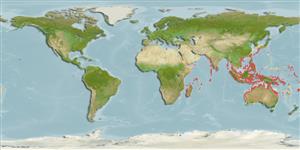>
Kurtiformes (Nurseryfishes, cardinalfishes.) >
Apogonidae (Cardinalfishes) > Apogoninae
Etymology: Fibramia: Latin 'fibra' meaning thread or filament and the feminine Greek 'amia' often applied as an ending for some cardinalfish genera as well as an incorrect past usage as a cardinalfish genus. The name refers to two characteristics of the species in this genus, an elongate second dorsal spine in one species and the narrow, pale or dark mid-line on the body of two species..
More on author: Cuvier.
Environment: milieu / climate zone / depth range / distribution range
Ekologi
marina revassocierade; ej vandrande; djupintervall 0 - 20 m (Ref. 48635), usually 0 - 12 m (Ref. 90102). Tropical
Indo-Pacific: south to Natal, South Africa (Ref. 4329) and east to western Pacific.
Size / Vikt / Age
Maturity: Lm ? range ? - ? cm
Max length : 8.5 cm TL hane/ej könsbestämd; (Ref. 90102)
Short description
Bestämningsnycklar | Morfologi | Morfometri
Taggstrålar i ryggfenan (totalt) : 7; Mjukstrålar i ryggfenan (totalt) : 9; Taggstrålar i analfenan: 2; Mjukstrålar i analfenan: 8. Black stripe from snout through eye to angle of opercle; tip of 1st dorsal present; caudal spot present (Ref. 4329, 48635). Sometimes has yellow barring on sides (Ref. 48635). 2-3 tiny black spots along base of dorsal fin; greatest depth of body 2.6-3.0 in SL (Ref. 90102).
Found in deep coastal reefs (Ref. 8631). Form small schools with outcrops on reef on sand to depths of 20 m (Ref. 48635); or among rocks or corals of shallow sheltered lagoons (Ref. 7300); often in seagrass beds (Ref. 37816). A nocturnal species (Ref. 7300).
Life cycle and mating behavior
Maturities | Reproduktion | Spawnings | Egg(s) | Fecundities | Larver
Mouthbrooders (Ref. 240). Distinct pairing during courtship and spawning (Ref. 205).
Kailola, P.J., 1991. The fishes of Papua New Guinea: a revised and annotated checklist. Vol. III. Gobiidae to Molidae. Research Bulletin No. 41, Research Section, Dept. of Fisheries and Marine Resources, Papua New Guinea. 153 p. (Ref. 6771)
IUCN Red List Status (Ref. 130435)
Threat to humans
Harmless
Human uses
Fiskeri: mindre kommeriell; Akvarium: Kommersiell
Verktyg
Special reports
Download XML
Internet-källor
Estimates based on models
Preferred temperature (Ref.
123201): 24.9 - 29.3, mean 28.5 °C (based on 2879 cells).
Phylogenetic diversity index (Ref.
82804): PD
50 = 0.6250 [Uniqueness, from 0.5 = low to 2.0 = high].
Bayesian length-weight: a=0.00501 (0.00201 - 0.01253), b=3.26 (3.04 - 3.48), in cm total length, based on LWR estimates for this (Sub)family-body shape (Ref.
93245).
Trofisk nivå (Ref.
69278): 3.5 ±0.50 se; based on food items.
Resiliens (Ref.
120179): Hög, lägsta populationsfördubblingstid mindre än 15 månader (Preliminary K or Fecundity.).
Fishing Vulnerability (Ref.
59153): Low vulnerability (10 of 100).
Nutrients (Ref.
124155): Calcium = 202 [104, 376] mg/100g; Iron = 1.09 [0.59, 1.88] mg/100g; Protein = 18.5 [17.4, 19.7] %; Omega3 = 0.103 [0.055, 0.201] g/100g; Selenium = 32.3 [14.1, 73.2] μg/100g; VitaminA = 81.2 [24.5, 255.6] μg/100g; Zinc = 2.32 [1.45, 3.50] mg/100g (wet weight);
